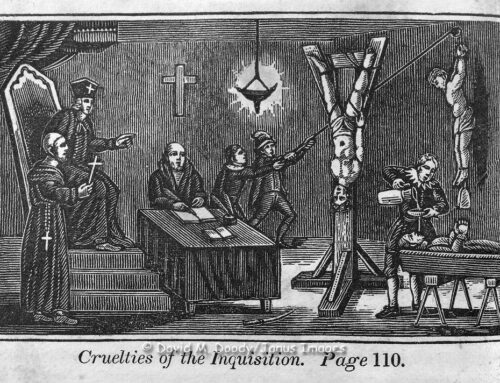People claim they cherish brevity, the truth, and reality when in reality they abhor the truth and are repulsed by reality. Always gravitating to the world’s explanations, the so-called “educated” and well thought out and researched “answers” to the questions. When the truth is, the reality is, people question Christianity — be they a professed believer lacking faith, appearing unaware of what being renewed of mind and spirit, born anew, made into a new creature died and resurrected with Christ means, but then, a person would need to spend time in God’s Word and in prayer to understand this — or if a pagan, an unbeliever, of the world — there is one reason and only one simple reason Christianity is questioned;
The individual listens to the minion of Satan, listens to the world, and believes the lies of the minion, the minister of Satan, the lies of the world over and above the clear, plain, truth of God and of God’s Word, of God’s Son, the Lord Jesus Christ. Rebelling no differently than did Adam and Eve in the Garden, not all that long ago. And nothing changing within human nature one iota ever since.
We each either hear God or hear the lies of this world.
We each either believe the Lord and all of His Word or we do not. We question. We believe in the lies of this world.
We each then have made our choice and selected where our eternal spirits and souls will reside. Either with God, the Lord Jesus Christ, the Holy Spirit, the prophets and apostles, and all of the elected heavenly hosts, or with Satan and all his fallen all his enslaved who made it all chaotic, confusing, muddy, and their doubt, their love of this world, their love of lies trumped their love and understanding of God, their love and understanding of what, and Who, and why God came to earth in Jesus the Christ, as they refuse to believe the truth and recoil from reality choosing to rebel and serve the world, thus remaining enslaved.
Tragically, eternally, lest they come out of darkness and into the light.
That’s why.
Everything else is an excuse.
No person can look to another person as to their reasoning for keeping them from believing in the Lord Jesus Christ, or in God, or in the whole of the Holy Bible. It is our sin, our rebellion that brought death, brought suffering, brought pain into the world. NOT God! It is our doing. Not God’s. Stop blaming God — especially when He made it possible for life in Jesus coming to earth as the Ultimate Sacrifice for our sin and rebellion!
God didn’t have to do such a thing. It was, it is out of His infinite love beyond human comprehension that He did so.
And either believe or don’t — but stop blaming God, stop blaming others, stop blaming anything else for your unbelief, your disobedience, your lack of faith, or any other contrived reason to question God, Jesus, the Holy Spirit, the Holy Bible, or Christianity.
Stop pointing the finger of blame elsewhere as to why you can’t believe and come to the Lord in faith. Or if professing to be a Christian you waver, you backslide, you refuse to commit wholly, faithfully, truly to the Lord.
Too much love of the world. Too much education over faith in God.
Where do you imagine that will eternally lead?
Ken Pullen, A CROOKED PATH, Monday, April 17th, 2023
Why People Question Christianity
A recent report by Barna Research listed the top reasons people question Christianity.
04/12/2023
By John Stonestreet & Kasey Leander
Reprinted from BREAKPOINT
AUDIO
Newsletter subscribers: Click on the large BREAKPOINT image to open the audio.
A recent report by Barna Research listed the top reasons people question Christianity. Among those who claim to be Christian, practicing or otherwise, the problem of human suffering (23%) topped the list, followed by hypocrisy of religious people (22%) and conflict in the world (19%). Among those who claimed no faith, religious hypocrisy was far and away the most cited response, identified by 42% as behind their doubt about Christian beliefs.
Christians have faced the charge of hypocrisy in various times and places. Around a century ago, G. K. Chesterton addressed it, specifically those who boasted of their humility, sought worldly success, and trumpeted it when they got it. Like Chesterton, we should not be surprised when Christians fall short of Jesus’ commands. As one theologian put it, “To be a member of the Church is to carry the mantle of both the worst sin and the finest heroism of the soul … because the Church always looks exactly as it looked at the original crucifixion, God hung among thieves.” Until Christ’s return, we will face accusations of hypocrisy. Many times, we will have earned them.
The Barna study results are also cause for optimism. While half of Christians have experienced doubts in the past few years, there is also an unprecedented openness to questions within the general population. Seventy-four percent of U.S. adults say they “want to grow spiritually.” Seventy-seven percent report believing in a higher power. Forty-four percent say that they are “more open to God today than before the pandemic.” As Barna CEO Dave Kinnaman summarized, “Though religious affiliation and church attendance continue to decline, spiritual openness and curiosity are on the rise.”
To say the least, the American spiritual landscape is complicated. A much-vaunted Pew study found, for example, that nearly two-thirds of Americans believe that trust, among both individuals and in institutions, is falling. This affects our most important relationships across the cultural spectrum, in everything from government to employment, from neighbors to political parties, from church to the news media.
In other words, we face a crisis that is also an opportunity. People who are spiritually hungry, relationally isolated, and tired of being suspicious tend to be more open to spiritual things than those who are overly distracted. Technology that was supposed to solve our deepest problems instead misunderstood what they were, isolating us into echo chambers. The only entity that can offer the worldview depth, relational connections, and moral formation required to rebuild trust is the Church.
The writer Sheldon Vanauken, author of A Severe Mercy, once wrote,
The best argument for Christianity is Christians: their joy, their certainty, their completeness. But the strongest argument against Christianity is also Christians—when they are somber and joyless, when they are self-righteous and smug in complacent consecration, when they are narrow and repressive, then Christianity dies a thousand deaths.
Led to Christ by none other than C.S. Lewis, Vanauken does not suggest here that Christians should retreat from public displays of faith, lest their inevitable public failures lead to additional charges of hypocrisy. Rather, it is the opposite. What the world needs most right now is more Christianity, not less: more people committed to connecting ultimate meaning with everyday life, more minds sharpened by and formed in the truth, more redeemed people open to discussing what matters with their lost and searching neighbors, more hearts alive to both beauty and suffering whose hope is in King Jesus and His kingdom.
The final answer to the charge of Christian hypocrisy is faithfulness, not perfection. What the world needs most is the Church to be the Church, full of Christians who embrace their faith as personal but not private, and as not so much inviting Jesus into our lives as accepting the invitation into His life.
The Colson Fellows program is a community of believers committed to learning and living faithfully under the fullness of Christ’s authority in this time and this place. We are committed to the church, to the formation of a Christian worldview, and to making sense of a confusing world with the heart and mind of Christ. To learn more about this program, please visit colsonfellows.org.







Leave a Reply, please --- thank you.